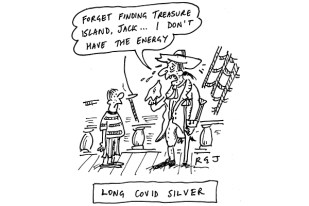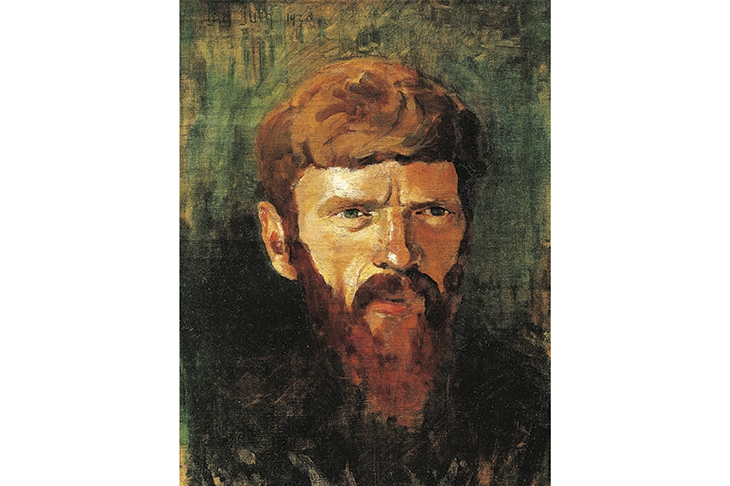When it comes to biography, some authors draw the punters, and others leave the mob cold. D.H. Lawrence has been written about a lot, from the moment he died. At least ten memoirs were published in the five years after his death by authors ranging from his sister and his wife to patrons such as Mabel Dodge Luhan. More followed, and only professional Lawrence scholars will have read all of them. There must be dozens of them, and some, such as the Cambridge three-volume effort by different authors, are immensely long. By comparison, there are only a handful of full-scale lives of James Joyce, and poor old Arnold Bennett has only one (excellent) biography, by Margaret Drabble. What is it about Lawrence that draws them so?
It might be something frustratingly incomplete about the literary output. Every aspect of his writing produces something masterly — ‘Birds, Beasts and Flowers’ among the poems, The Rainbow from the novels and the magnificent ‘Studies in Classic American Literature’ from the essays. But as a body of work, probably only the short stories are consistently brilliant. Among the novels, on which his fame continues to rest, even Women in Love is, in the end, an interesting sort of experiment and static for most of its length. Many of the others are pretty bad, dashed off carelessly — The Plumed Serpent — or simply absurd, such as The Lost Girl. You have to dig around, and even an admirer like me has to admit that the standard of the best work isn’t sustained throughout.
The life, however, is undeniably fascinating. Lawrence belonged to a generation which was trying very consciously to break with the public conventions of the past. Several people took to saying the unsayable. Virginia Woolf gives an account of what happened one August day in 1908 when Lytton Strachey came into a room where she and her sister Vanessa Bell were sitting. ‘He pointed his finger at a stain on Vanessa’s white dress. “Semen?” he said.’ Thereafter ‘the word “bugger” was never far from our lips’. Single women such as Rebecca West had children with their lovers publicly and did not retreat to the country or to quiet villas in St John’s Wood. Others, such as Bryher or H.D., changed their names to something unimaginable and started living with lovers of the same sex. Everything that had previously been believed was up for questioning, or frank contradiction: ‘There is something horrible about a flower,’ Charlotte Mew wrote.
Lawrence was of that working-class generation who benefited from universal education, and who, like H.G. Wells, came to despise it. The product of benevolent egalitarianism, in constant poor health, he came to fantasise about the extermination of the sick and maimed in ‘a lethal chamber as big as the Crystal Palace’ and to endorse the fascist view that ‘the lower classes can never make life whole again till they do become humble, like the old peasants, and yield themselves to real leaders’. He was pretty clearly homosexual, as many people thought during his lifetime and which is apparent from the suppressed prologue to Women in Love. For years, however, he was terrified of the idea and of the company of homosexuals, who were generally wary of him. (I think it very unlikely that E.M. Forster would have shown him the manuscript of Maurice, as Frances Wilson suggests.)

The conflicts between Lawrence’s opinions and his life are endless and impossible to reconcile — and of course are a rich terrain for biographers. There is, at bottom, a sense that Lawrence was trying to forge a new way of existence. His constant breaking of rules led to trouble — accepting Lady Ottoline Morrell’s hospitality before abusing her as Hermione Roddice in Women in Love was the least of it. Writing books that no publisher could bring out was not unique to Lawrence, but it did become rather a habit, from The Rainbow to Lady Chatterley’s Lover. Those around him made what they could of these new ways of behaviour — or failed to. The Cornish authorities expelled him and his German wife Frieda from the county, believing they were spies sending signals to enemy boats. Most of all, there are Lawrence’s years of exile, following W.H. Davies’s principle of the ‘Super-Tramp’, travelling the world in search of a refuge and, ideally, a patron.
Burning Man follows Lawrence during his most turbulent years, 1915–1925, between the debâcle of the publication of The Rainbow and the finishing of The Plumed Serpent. Whether this represents the ‘ascent’ promised by her subtitle seems rather doubtful. In these years, he led a migratory life, first in England, then in Italy, Florence and Sicily, and finally in New Mexico and Mexico. Wilson tells the story well. It was a period of uncertainty, of bonds being shed and reforged; of the immense growth of Lawrence’s reputation, while many of the new directions failed to impress.
The Cornish authorities believed Lawrence and his German wife were spies, sending signals to enemy boats
Wilson is an experienced and accomplished biographer, so I’m surprised that she has committed the novice’s mistake of forcing a tumultuous and very various body of experience into a predetermined structure. It’s unsatisfying to shape Lawrence’s life according to a progression taken from Dante, moving from hell in England to paradise in New Mexico. Lawrence’s thoughts on Dante can’t be used throughout — his interest in the poet came and went; the parallels Wilson draws all too soon become the main thing, and often fail to convince. For example, Mabel Luhan
explained that she had ‘sensed’ from the start ‘Lawrence’s plight’ and ‘willed him to come’, which is what Beatrice also tells Virgil in Inferno… How far was [Mabel’s] home from Santa Fe? Did Mabel know anything about ships from Italy to New Orleans…to avoid docking in New York?… When Beatrice led Dante by the hand through the vast bright air of Paradise, he too was overwhelmed with questions.
Where the biography succeeds, away from these enforced parallels, is in painting a portrait of two monstrous figures in Lawrence’s progress. Both have had separate biographies, but they are worth another visit. In Italy, Lawrence was battened on by the terrible Maurice Magnus. He claimed to be the illegitimate son of German royalty and had been a member of the Foreign Legion and the manager of Isadora Duncan. He made a habit of cashing cheques for vast sums in hotels and running off with the money. A homosexual, he was a close associate of Norman Douglas, and, hitting on Lawrence in a relatively flush period, sponged off him to a spectacular degree before finally committing suicide in Malta. Lawrence arranged to have his largely obscene book about sexual practices within the Foreign Legion published, as far as it could be, under the winning title Dregs, hoping to make enough money to pay off Magnus’s creditors. Lawrence also wrote a startlingly insulting but very lively account of his acquaintance with Magnus as an introduction, one of his best pieces of writing. Douglas responded, energetically, and another feud was added to Lawrence’s long list. There is a full-scale life of Magnus by Louise E. Wright.
The second monster was the millionairess Mabel Luhan, a patron of modernism who had set up shop at Taos in New Mexico with a tame native sage, Tony Lujan. She imparted a fair amount of guff about indigenous wisdom to Lawrence and Frieda: ‘The mountain, if anything, came to one, came into the house.’ (‘The house’ was a very comfortable adobe palace, built by Mabel to her own design — ‘her great accomplishment: part Spanish revival, part English country house, part Florentine palazzo’.) Lawrence was a match for her. She had imported him, it soon became apparent, so that she could tell him her life story, he could listen carefully — ‘a complete, stark approximation of a spiritual union,’ Mabel later called these conversations, hopefully — and be installed in one of the many spare rooms to write a novel about her. It all ended badly, predictably enough, with exchanges in print.
It’s easy to be amusing about Lawrence, but there is no doubt that he saw more clearly than almost anyone else. He writes, in ‘Studies in Classic American Literature’, to dismiss the notion that
America is the land of the free! Why, if I say anything that displeases them, the free mob will lynch me, and that’s my freedom. Free? Why, I have never been in any country where the individual has such an abject fear of his fellow countrymen.
Some of his books are terrible; some, undoubtedly, are magnificent. And he’ll continue to attract biographers, even though everything that can be discovered about his life must by now have appeared in print.
His story goes on being an interesting one, but I naggingly felt, reading Wilson’s book, that what it needs is a biographer prepared to plunge into the blind chaos of unknown motivations and meaningless actions. This is not a life on which to impose an orderly structure — taken from, of all things, the sequential progressions of classic literature.






Comments